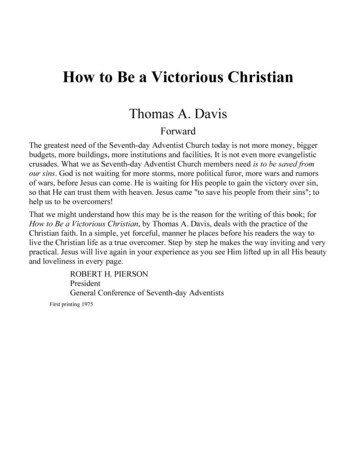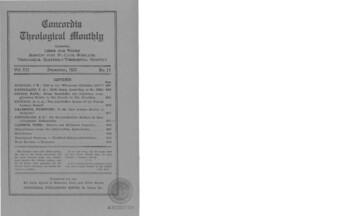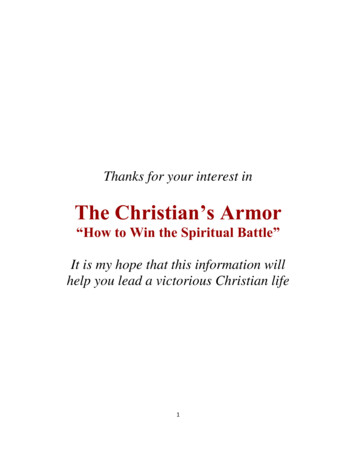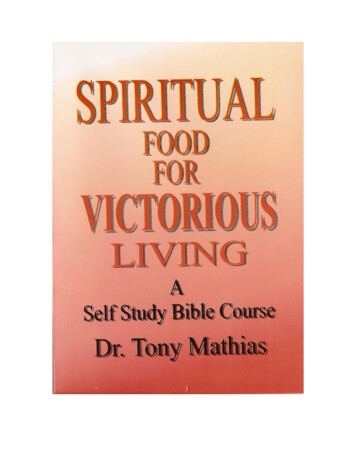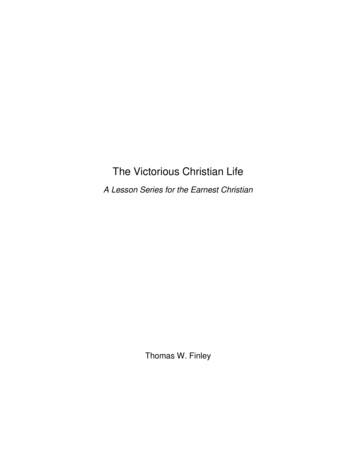
Transcription
The Victorious Christian LifeA Lesson Series for the Earnest ChristianThomas W. Finley
THE VICTORIOUS CHRISTIAN LIFEA Lesson Series for the Earnest Christian 2002 by Thomas W. FinleyRevised Edition 2013All Scripture is quoted from the New American Standard Bible, unless otherwise noted. ,Scripture quotations taken from the New American Standard BibleCopyright 1960, 1962, 1963, 1968, 1971, 1972, 1973,1975, 1977, 1995 by The Lockman FoundationUsed by permission. (www.Lockman.org)Scriptures quoted from the King James Bible are marked “KJV.”Scripture quotations marked “NKJV” are taken from the New King James Version.Copyright 1982 by Thomas Nelson, Inc. Used by permission. All rights reserved.Scriptures quoted from the Amplified Bible are marked “AMP.” Scripture quotations taken from the Amplified Bible,Copyright 1954, 1958, 1962, 1964, 1965, 1987 by The Lockman FoundationUsed by permission. (www.Lockman.org)Scripture quotations taken from the “New Translation” Bible by J. N. Darby are marked “Darby.”Scripture quotations marked “Wuest” are taken from “The New Testament: An ExpandedTranslation by Kenneth S. Wuest.”Copyright Wm. B. Eerdmans Publishing Co. 1961. All rights reserved.Scripture quotations marked “Williams” are taken from “The New Testament in the Language ofthe People” by Charles B. Williams. Copyright 1937, by BRUCE HUMPHRIES, INC. CopyrightRenewed 1965 by Edith S. Williams.Permission is granted to translate, copy, reprint or distribute this book. Free distribution isencouraged. Copies may not be sold for profit without the express permission of theauthor. Quotation privileges are also hereby granted.Copies may be ordered over the Internet at the author’s website:www.seekersofchrist.org2
ContentsIntroduction . 5LESSON 1 . 7View of the Unbeliever . 7LESSON 2 . 9View of the Believer as a New Creation . 9LESSON 3 . 11View of the Believer According to Experience . 11LESSON 4 . 18In Adam vs. in Christ . 18LESSON 5 . 20How God Transferred Us from Adam into Christ . 20LESSON 6 . 23The Totality of Our Death and Resurrection . 23LESSON 7 . 26Living the Identification Truths – A Walk of Faith. 26LESSON 8 . 32Freedom from Law . 32LESSON 9 . 37Under Grace . 37LESSON 10 . 41Under Grace (continued) . 41LESSON 11 . 45Characteristics of the Overcomer – A Seeking Heart . 45LESSON 12 . 48Characteristics of the Overcomer – Willing to Suffer . 48LESSON 13 . 51Characteristics of the Overcomer – Willingness to Suffer - Dying to Self . 51LESSON 14 . 56Characteristics of the Overcomer – Willing to Suffer (continued) . 56LESSON 15 . 61Characteristics of the Overcomer – Willing to Suffer (continued) . 613
LESSON 16 . 64Characteristics of the Overcomer – Fully Following the Lord . 64LESSON 17 . 68Practices of the Overcomer – Handling the Word of God . 68LESSON 18 . 71Practices of the Overcomer – Handling the Word of God (continued) . 71LESSON 19 . 75Practices of the Overcomer - Prayer . 75LESSON 20 . 78Practices of the Overcomer – Maintaining a Blameless Conscience . 78LESSON 21 . 81The Conscience of the Believer. 81LESSON 22 . 85Challenges to the Overcomer . 85LESSON 23 . 91Challenges to the Overcomer (continued) . 91LESSON 24 . 95Victorious in Works . 95CONCLUSION . 101APPENDIX A . 103About the Author . 105Select Bibliography . 1064
IntroductionThe victorious Christian life is the life that God wants to see lived by us. It is not sinlessperfection, yet it is the growing consistency of a holy life and witness in many areas. We shouldnot be satisfied with anything less.If you have experienced a cycle of failure and confession over some “besetting sin” that seems tohave a grip on you, and you truly want victory, then this book is for you. If your Christian life isinconsistent and you are not satisfied with it, then this book is also for you. If you want to grow inthe Lord, and wish to know Him more deeply and intimately, then this book is for you.The victorious Christian life is Christ Himself living in us and through us. It is not us trying harderto please God. Quite frankly, the harder we try in our own effort to live up to God’s standard, themore certain our failure will be. God wants to supply us with His victorious life. In this series oftopics, or lessons, we will explore how we can tap into the supply of Christ’s life that is withinevery believer.This book is not a comprehensive work of all of the aspects of the Christian life, but it will providea foundation for you. We will explore truths, principles and practices that have been tested overtime by victorious Christians throughout the centuries. All that I have set forth here is based uponScripture and the best writings that I have found on the Christian life. Finally, I can testify thateverything I pass on here has been tested in my own experience. I am not perfect, but by God’sgrace I do know the life of victory over so many things in my own experience. For this I givepraise and glory to God.It should be helpful at this point to provide you with an overview of what we will cover. Some ofyou may not be as drawn to the doctrinal aspects of the book, especially in the section on the“identification truths” (Lessons 4-7). These are those Biblical truths that show us that we are fullyidentified with Christ in His death and in His resurrection. Yet this doctrinal foundation is vital.Paul wrote to the Romans: “Or do you not KNOW that all of us who have been baptized intoChrist Jesus have been baptized into His death?” (Rom. 6:3). All of our experience must bebased upon truth. In talking to the Jews who had believed in Him, Jesus pointed out that theyneeded to be free from the enslavement to sin, and He said: “If you abide in My word, then youare truly disciples of Mine; and you shall know the truth, and the truth shall set you free.” (Jn.8:31-32).Because truth is the foundation for our experience, I encourage you to persevere in reading thesomewhat doctrinal portions. By the way, these sections also include practical application to ourexperience. Then, as you can see from the overview below, there are other sections which touchmore on our practices and on our attitudes as “overcomers” (victorious ones). There is nothingwrong in skipping ahead to look at these areas if you get bogged down in reading some of themore doctrinal lessons. However, I would urge you to be sure to read all of the lessons in order toget a balanced and inclusive view of how to be victorious. May God richly bless you with HisSpirit as you read and consider these things. Views of the unbeliever and the believer. These three lessons will give you a solid, Biblicalunderstanding of the life of the unbeliever, the life of the believer as seen “in Christ,” and the lifeof the believer in his experience. These lessons will greatly benefit your understanding of someof the contradictions and struggles you sense as a believer in Christ. The “Identification Truths.” Here we look at the Scriptural truth that our old fallen life wascrucified with Christ. Additionally, we see that we have risen with Christ to live out a new life,5
which is Christ in us. These lessons will show us how to transfer these truths into our experience.Common mistakes that believers make in trying to live the Christian life are corrected here. Freedom from the law and life in the spirit. These vital lessons explain how we serve andplease God in the New Testament era. We are freed not only from the commandments of thelaw, but even the principle of the law. Now we are under the principle of grace, which suppliesand empowers us. Now we serve God by living in our spirit in union with Christ. We follow Himthrough the living direction and power of the Holy Spirit, not through our efforts to keepcommandments. Characteristics of the overcomer. In these lessons we gain insight into the disposition andattitudes of victorious Christians. Seeing these will help us shape our own heart attitudes. Practices of the overcomer. Here we explore the Christian disciplines that are indispensable ifwe wish to be victorious. God’s call to overcome. In these lessons we see that God is calling believers to overcomemore than just sin. We are to overcome sin, evil, the devil, the world, false prophets, negativecircumstances, and degraded church situations. We are also to be victorious in good works,carrying out those works which God has prepared for us. By learning where God wants us toovercome, we can more accurately interpret what the Holy Spirit is trying to do in our life. In thisway, we can cooperate with His working.6
LESSON 1View of the UnbelieverThe first view we need to clearly see is the picture of a person who has not yet believed in Christ.This is a person still “in Adam.” This is the unregenerate person. The “old man” of Romans 6:6 iswho we were in our unregenerate state.Men outside of Christ are inherently sinful. Sin is embedded in their nature and they commit sinsbecause of this sinful element within them. What is sin? The common Greek word for sin ishamartia (Strong’s #266), which means “missing the mark.” When an archer aims for the target’sbulls-eye and misses, he misses the mark. Christ, as God in the flesh, was without sin in Hishuman living (Heb. 4:15). This helps us see “the bulls-eye” – Christ Himself. When Christ isseen in the living of a human, He is especially seen in His unique moral character. Not only wasChrist’s character perfect, but He also perfectly followed God’s will for each step of His life (Jn.6:38; Phil. 2:8). By this we can see that sin is anything in a person’s life that does notconform to Christ, particularly His moral character and His obedience to the will of God.Sin can be in the form of an act, a disposition, or a state of man. When we consider an act of sinit seems that sin can include any meditation of the heart, any attitude, or any action that does notconform to God’s character or God’s will. Let’s clarify “meditation of the heart” – an inner, unseensin. For the believer (or unbeliever), a sudden thought, even a very evil thought, is not in itselfsin. It may come to our minds by way of our old sinful nature, or spiritual forces allied with thedevil. Yet, it is only as we accept that invitation to sinful thinking and dwell upon it, relishing it andgiving way to it, that sin is brought forth in God’s eyes (Jas. 1:13-15). The involuntary thought isnot sin, but the voluntary meditation upon that thought at some point becomes a sin.Below are two basic characteristics of a person who is an unbeliever:All humans are born with a sinful disposition. Human nature, in its broadest sense, meansthat unique set of attributes which makes man a distinct creature. For example, the sum total of ahuman being’s attributes clearly distinguishes human nature from the elephant, which has its ownunique set of attributes. Adam was not created sinful, but through disobedience to God sinentered the world and affected the entire human race (Rom. 5:12, 19). Now, all humans have anembedded sinful disposition. They retain a distinctly human nature, but an additional corruptingfactor has come in. This sinful disposition is passed on from generation to generation of humansby birth.This sinful disposition has two fundamental and related characteristics: 1) It is at enmity with God– it resists God and His will (Rom. 5:10; 8:7); 2) It is unholy, unlike the moral character of God(Rom. 3:23; 1 Pet. 1:14, 15).“Behold, I was brought forth in iniquity, and in sin my mother conceived me.” (Ps. 51:5)“For all have sinned and fall short of the glory of God.” (Rom. 3:23)“Therefore, just as through one man sin entered into the world, and death through sin, and sodeath spread to all men, because all sinned.” (Rom. 5:12)7
“For as through the one man's disobedience the many were made sinners, even so through theobedience of the One the many will be made righteous.” (Rom. 5:19)All unbelievers are slaves of sin. Not all men (unbelievers) commit the same sins, or areequally sinful. Yet, it is a key concept that fallen man is indeed a slave of sin and is stronglybound in a master/slave relationship to indwelling sin. An unregenerate person is heldutterly captive to the mastery of his sinful disposition and cannot escape its controlling power.“But thanks be to God that though you were slaves of sin, you became obedient from the heartto that form of teaching to which you were committed.” (Rom. 6:17)“And you were dead in your trespasses and sins, in which you formerly walked according to thecourse of this world, according to the prince of the power of the air, of the spirit that is nowworking in the sons of disobedience. Among them we too all formerly lived in the lusts of ourflesh, indulging the desires of the flesh and of the mind, and were by nature children of wrath,even as the rest.” (Eph. 2:1-3)In the verses just above we see that the unbeliever indulges, or yields to, the lusts of the flesh.The “desires of the flesh” here refers to the desires of the fallen sinful nature within man, whichincludes corrupt desires of the body, the soul and the spirit. Thus the unbeliever’s life iscontrolled by the sinful nature.8
LESSON 2View of the Believer as a New CreationThis view of the believer depicts the truth of who we are according to spiritual reality. It does notrepresent how we always live in our daily experience in this life. The view of the believer inLesson Three will cover the matter of our daily experience.We are a “new creation” according to God’s spiritual view, according to our “position in Christ,”and also according to actual spiritual reality. When we are born again, we became such totallynew creations.“Therefore from now on we recognize no one according to the flesh; even though we have knownChrist according to the flesh, yet now we know Him in this way no longer. Therefore if anyone isin Christ, he is a new creature; the old things passed away; behold, new things have come.” (2Cor. 5:16, 17)In the passage above, to recognize someone “according to the flesh” means to view them froman understanding and perspective that is merely human. In contrast, to know others and Christ ina spiritual way is to perceive them with spiritual revelation and according to spiritual reality. InMatt. 16:13 Jesus asked the disciples, “Who do people say that the Son of Man is?” Theiranswer indicated that people viewed Jesus as perhaps John the Baptist or one of the prophets.But, Peter then correctly recognized who Jesus really was, not just who He appeared to be byhuman estimation. Because Peter had spiritual revelation of who Jesus was, he could say thatHe was the Messiah. The passage above then states that “Therefore, if anyone is in Christ, he isa new creature.” This means that a believer correctly viewed according to spiritual reality andrevelation is a totally new person.Notice in the passage above it states that the old things have passed away and now new thingshave come. The person we now are, according to the realm of spiritual reality, is totally differentthan the person we were before our regeneration (our being born again). It is important torealize that this radical difference is in the spiritual realm, not in the realm of what we and otherssee and experience here and now in our fleshly existence. Yet, as we shall see later, the effect ofthis spiritual change can increasingly be manifested here in this life.Who we now are “in Christ” is not just a matter of how God views us. It is not just a theoreticalmatter. An actual change has taken place in our being. When we believed in Christ we wereliterally “born again” with a new life imparted to us by God. This new life is in our being today.Jesus described this new birth in John 3:"That which is born of the flesh is flesh, and that which is born of the Spirit is spirit.” (Jn. 3:6)Here Jesus contrasts our physical birth from physical parents to our spiritual birth by the HolySpirit. The Bible is specific here in telling us that what has been born of the Spirit is spirit,referring to our human spirit. We believers are of three distinct parts: spirit, soul, and body. Thisis shown in the following verse:“Now may the God of peace Himself sanctify you entirely; and may your spirit and soul and bodybe preserved complete, without blame at the coming of our Lord Jesus Christ.” (1 Thess. 5:23)9
The new birth changes our person according to the spiritual realm and it also begins a process ofreal change in our life here and now. At the moment we are born again, our human spirit iscompletely changed by the impartation of the life of God. Our soul and our body, however, arenot really changed at the instant of the new birth, except, of course, our thinking about Christ andHis redemption has changed. Our soul has the basic faculties of our mind (thinking), ouremotions and our will. Our living as humans is an expression of our inner soul, and thus ourliving is based upon our thinking (our mind), our emotions and our will (decisions). Thisexpression of our soul, how we live our lives out, should gradually change in our experience inthis life now, based upon the spiritual change that has already taken place in our spirits. Also, theuse of our bodies should also begin to change after we are born again.The new birth of our spirit brings the impartation of a new disposition within our human spirit.This disposition has the holy nature of God, which is the holiness of His moral character. TheBible tells us that we are born again of the imperishable seed of God through the living word ofGod (1 Pet. 1:23). This new holy disposition within is also seen in the fact that we have become“partakers of the divine nature” (2 Pet. 1:4). In line with the rest of the Bible and the context ofthis verse, we understand that “the divine nature” is God’s unique and pure moral character, notHis personal attributes of deity like omnipotence. Our human spirit is said to be alive, or literally“life”: “If Christ is in you, though the body is dead because of sin, yet the spirit is alive [literally,“life”] because of righteousness” (Rom. 8:10). The “life” here speaks of the unique moralcharacter of God’s life as the essence of our reborn spirit.The new disposition now in our human spirit gives us a desire to be obedient to God. This newdisposition gives us a strong desire for holy living. Also, this new disposition gives us all newcapacities for living as a human being. This holy disposition equips us with “the mind of Christ,”which is the ability to understand spiritual truths, to know God, and to have a way of thinking likeGod (1 Cor. 2:16). Also, because we possess a new disposition, we have a new capacity toexhibit godly emotions. All of the admonitions of the New Testament to love are based upon thisnew capacity, which is God’s love within us, within our new disposition (1 Jn. 4:7). Finally, wehave a new capacity to choose (the will), which is inherent in the new disposition. Christ alwayschose to do the will of the Father, and we now have Jesus’ life in our new disposition.In the next lesson we shall see something of the inner battle within us, which frustrates us fromalways living in accordance with our new disposition. Nevertheless, it is extremely important forus to continually confirm the truth of what has happened to us when we believed. At that point,according to the spiritual realm, we became new creations. We are now no longer who we were.As we are now “in Christ,” that is we are now “united with Him,” the old things have passed awayand new things have come. We have changed radically. In addition, even now in our experiencesomething has happened. We have been reborn in our human spirits. Our spirits have beenreconstituted with a holy disposition, which matches the holy character of God, our Father.Surely our response to these truths must be “Hallelujah!”10
LESSON 3View of the Believer According to ExperienceIn looking at our actual experience as a believer we are struck by something. We sense that wehave undergone some type of change since we believed in Christ. We at least now believe thatHe really is the Savior. Our knowledge of Him is not simply related to history or theology, but it issomething we know deep within. He has become real. We also now have a certain love towardsChrist and some desire to please Him and obey Him. On the other hand, there often seems to bea contrary attitude within us. We still seem to want to be independent of God and do what wewish with our lives. The old temptations to sin and the love of the things of this world, whichdominated our lives as an unbeliever, seem to be very much alive within us still. Too many timeswe actually want to go along with these temptations and longings. Some sins still seem to holdsome attraction for us.Thus, we are left with a number of questions. Did I really get “saved?” If I am a Christian, why doI have these struggles with sin and why do I sometimes wish to ignore God and choose my ownway?If I do some of the same sinful things I did before I got “saved,” am I not, then, still a“sinner?” If I am trying to “do better,” yet still experiencing failure, why?Much of our frustration is due to a lack of understanding and wrong expectations. Let us now tryto clarify the truth, see the truth, and believe the truth.The conflict within us is due to the presence of two dispositions within our being. There isindeed a conflict of desires and intentions within us after we are born again. In Lesson One wesaw that all humans have a sinful disposition within them from birth, urging them to sin, and evencompelling them to carry out sins, as a master rules over a slave. Guess what? This sinfuldisposition (or sin nature or indwelling sin) remains within us, within our being, even after ourspirits are born again by the Spirit of God. It is still there, as ugly as ever, bothering us all thetime with sinful thoughts, urges, suggestions and temptations! On the other hand, within ourreborn spirits, is a holy disposition, which gives us a desire to live a godly life, a life pleasing toGod and obedient to God. There could not be two more opposite “attitudes” in the universe! Andyet these two different “attitudes” are both within us in our experience!Let me hasten to say, however, that as we mature as a believer we learn how to cut off and“defuse” the power of the thoughts and urgings of the sinful disposition within us. A simple butimperfect illustration might help. Picture the sinful disposition as a radio and its music as itsthoughts or urgings. As each of us likes different types of music, so our sinful dispositions do varysome. Some people may be more prone to one type of sin than another. On the other hand,some sins seem to grab at us all, and these are like certain beautiful songs that everyone enjoys.When a radio plays one of your favorite tunes, it is hard not to hum along or sing along. The tuneis the kind you like and you naturally fall into line, humming along with it. When a mature believerstarts to hear one of his favorite “songs” being played by his radio (his sinful disposition), he haslearned how to react quickly to “turn down the volume” so that the music loses its compellingpower. This is one of the great blessings of living more and more in the victory of Christ.However, even the very mature believer is keenly aware of the presence of sin within him, andknows that it is ever trying, if possible, to make him fail. The victorious believer never gets rid ofthe sinful disposition and its promptings; he only learns to walk in victory by denying sin’s rule inhis life.11
In summary, the fact is that in the experience of the believer, he never gets rid of the sinfuldisposition in this life, which is constantly urging him to act contrary to God’s will and God’s holynature. Two dispositions – one geared to holiness and the other to sin - are there within us, inconflict, every day of our human lives. We will say more about this conflict in future lessons.We are saints, not sinners, in our true identity. This fact is a vital fact that every child of Godmust lay hold of. It is critical if we are to have victory!Yes, we have two dispositions within us which oppose each other in our experience. Both areoperating to influence and control us. However, we are not two persons. Additionally, we are notone person with two personalities. According to God’s revelation we are clearly “saints,” meaningsanctified or holy ones. This truth concurs with what we saw in Lesson Two. We are saints inGod’s spiritual view, but this sp
The victorious Christian life is Christ Himself living in us and through us. It is not us trying harder to please God. Quite frankly, the harder we try in our own effort to live up to God’s standard, the more certain our failure will be. God wants to supply us wit
